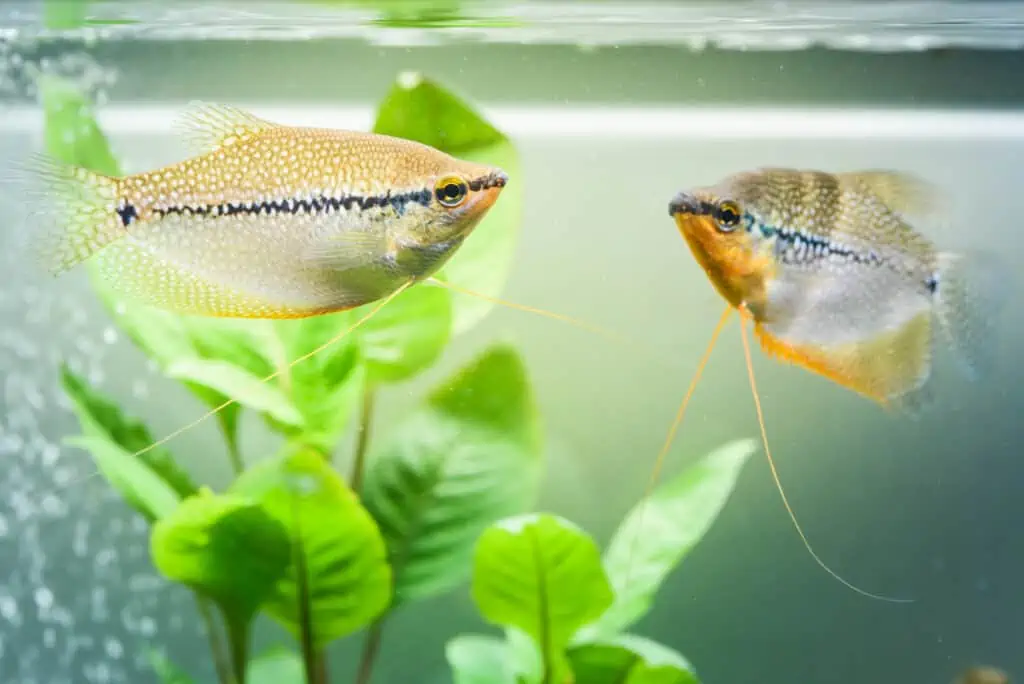Most freshwater aquarium fish prefer to live in a hard water environment in your fish tank. However, there are quite a few fish species that prefer softer water conditions.
Providing the optimum water conditions for your fish is essential for their well-being and overall health.
But how do you determine whether your fish tank water is hard or soft? Why does the hardness of water matter for fish? What type of water will be best for your fish?
Read this guide to learn which fish species prefer to live in a soft water environment.
What Is Water Hardness In The Aquarium?
General water hardness, not to be confused with carbonate hardness, is directly linked to water pH and acts like a buffer. So, if you’re having problems with the pH in your tank and you need to adjust it, you’ll need to adjust the water hardness first.
General hardness measures the mineral quantity of the water, specifically the levels of magnesium ions and calcium.
Those minerals are important for the health of many fish and invertebrate species, building bone, facilitating ion exchange, and regulating the creature’s metabolism.
If your water hardness is not suitable for your fish, they won’t thrive, and their lifespan might be shorter.
You can read more about how aquarium water hardness affects your fish in the article at this link!
Is My Aquarium Water Soft Or Hard?
You can check the hardness of your aquarium water by using an aquarium water testing kit.
General water hardness is usually referred to as GH and is measured in degrees. Commonly, you’ll see the figure written as dGH or °GH. Sometimes, you’ll find GH notated in parts per million (ppm).
Don’t get general hardness confused with carbonate hardness! Carbonate hardness (KH) refers to the alkalinity of the water and measures the levels of bicarbonates and carbonates in the water.
12 Soft Water Aquarium Fish
Now, let’s take a look at 12 of the most popular species of tropical freshwater aquarium fish you might want to consider keeping in a softwater community tank.
Discus (Symphysodon spp.)

- Water temperature: 82°F to 86°F
- pH level: 6.0 to 7.0
- Water hardness: 4 to 8 dGH
Discus fish are beautiful tropical freshwater pet fish that prefer extremely warm water that’s soft and acidic.
These fish are sensitive to water parameters, and it’s worth checking with the store you purchased them from to find out the exact water conditions in their tank. That way, you can replicate those conditions as closely as possible at home.
RO (reverse osmosis) water is best for a discus aquarium. You’ll need to add a mineral supplement to the water to satisfy the fish’s physical needs.
German Blue Ram (Mikrogeophagus ramirezi)
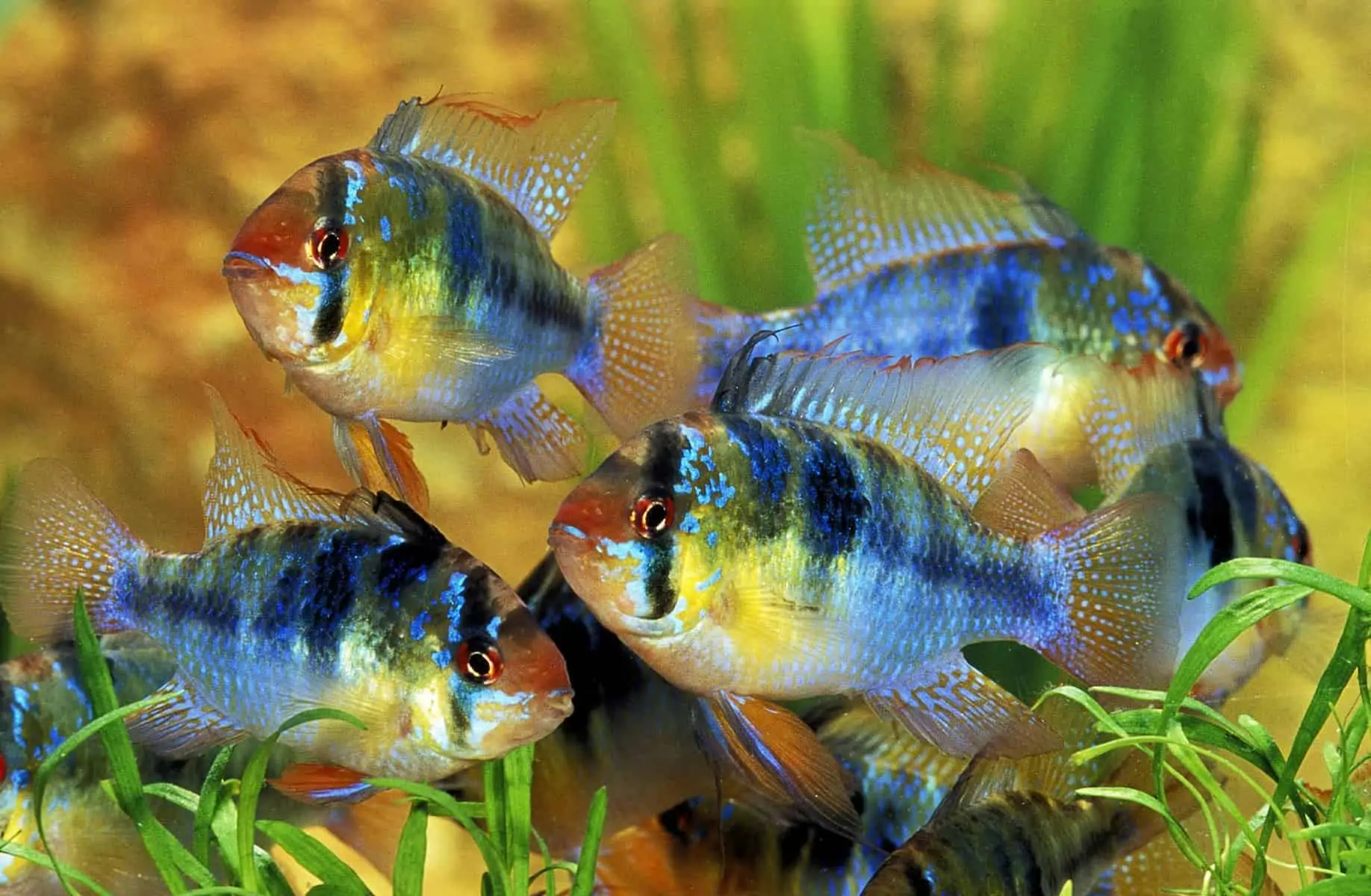
- Water temperature: 78°F to 85°F
- pH level: 6.0 to 7.5
- Water hardness: 6 to 14 dGH
The German Blue Ram is a peaceful fish that comes from the Orinoco River basin in Colombia, South America.
The fish thrive in warm, acidic slow-moving waters that are generally stained by tannins and are shaded by the overarching tree canopy. These pretty little fish make a gorgeous addition to a cichlid tank.
Glowlight Tetra (Hemigrammus erythrozonus)
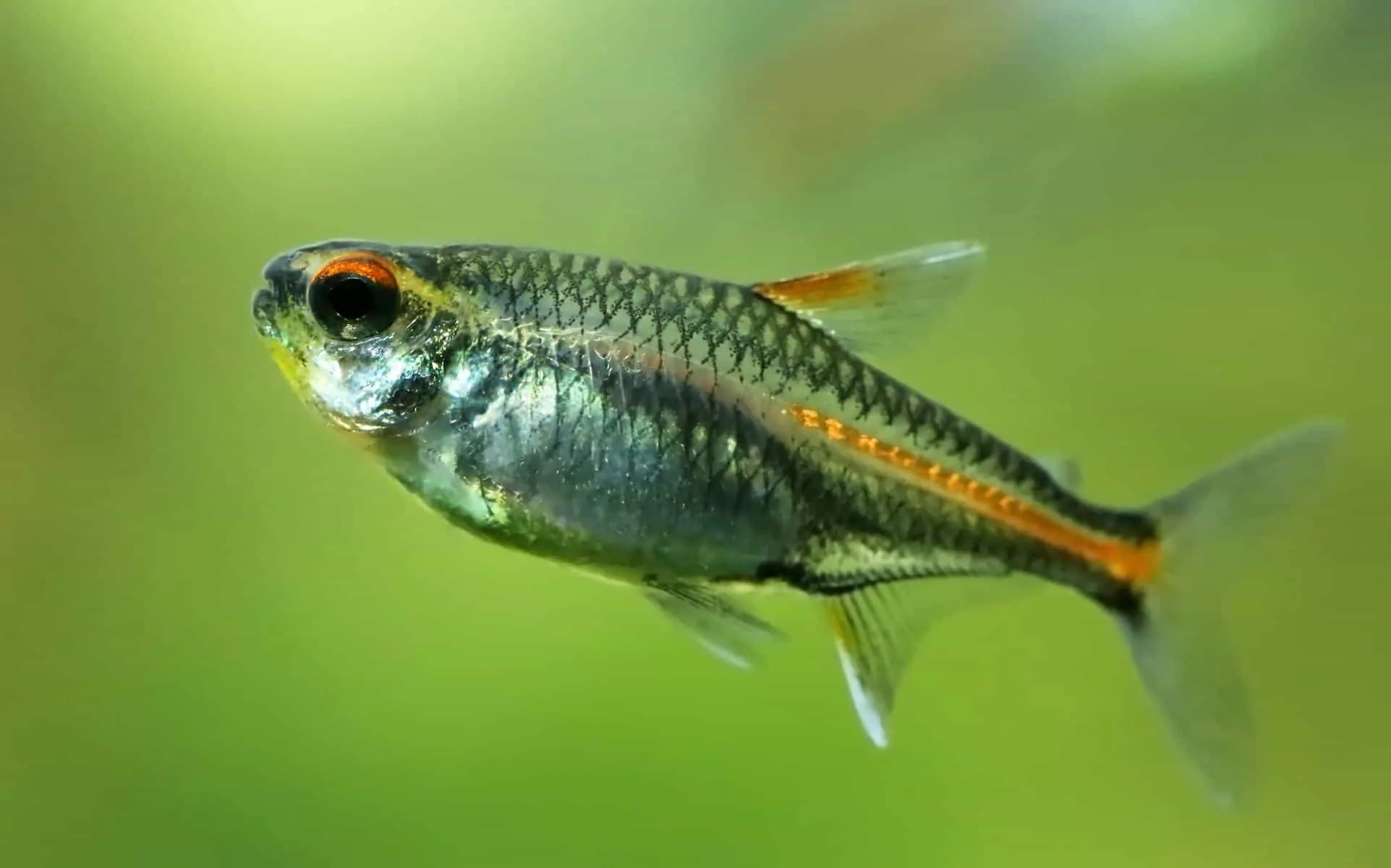
- Water temperature: 75°F to 82°F
- pH level: 5.5 to 7.0
- Water hardness: up to 15 dGH
Glowlight tetras originate in Guyana, South America, specifically from the Essequibo River.
These pretty little fish inhabit small blackwater tributaries in heavily forested areas rather than the main river. In the tetras’ natural habitat, the water is soft, acidic, and stained by tannins.
Glowlight tetras are peaceful schooling fish that typically congregate in large gatherings in the central area of the water column.
Cardinal Tetras (Paracheirodon axelrodi)
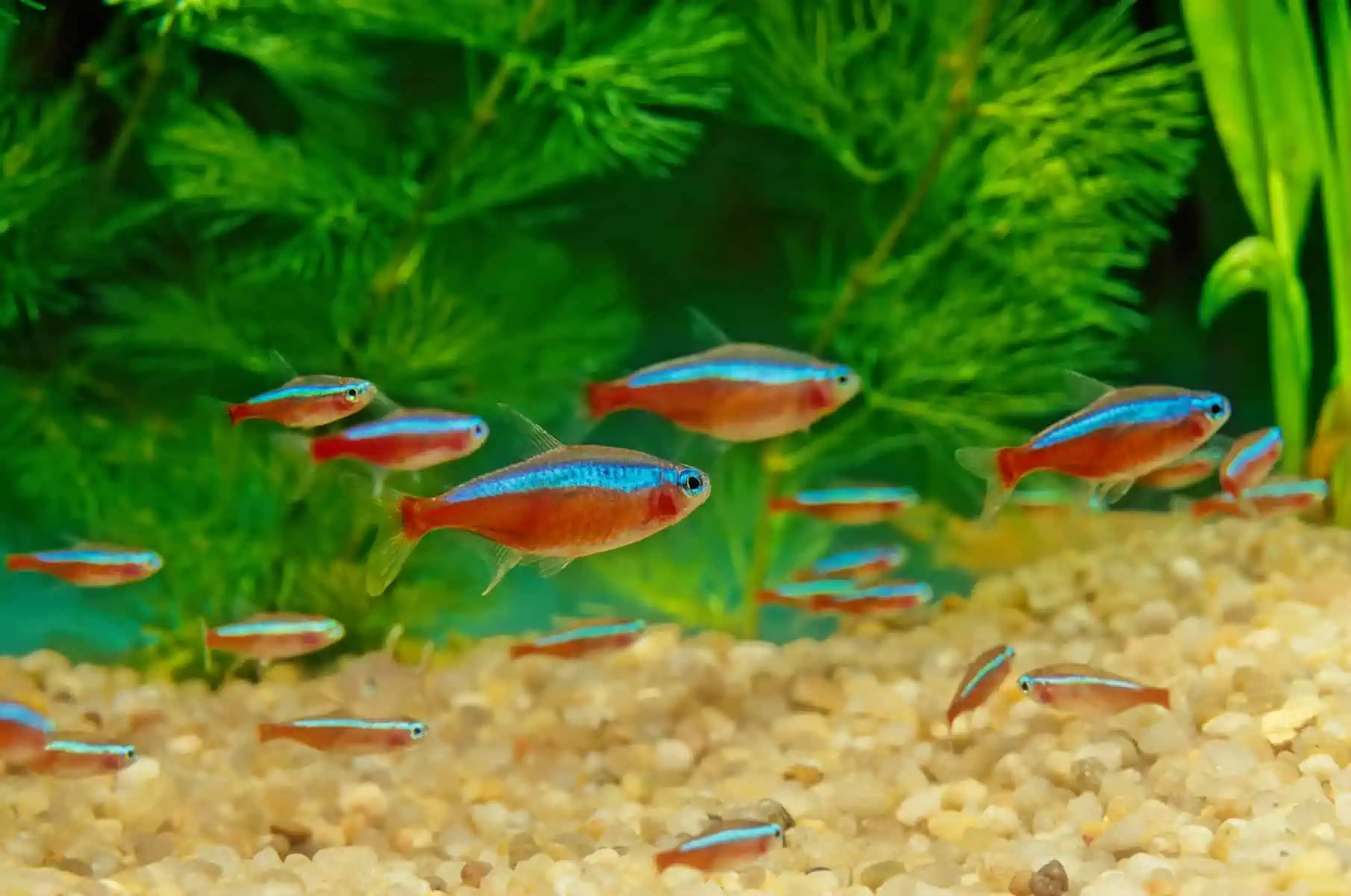
- Water temperature: 73°F to 81°F
- pH level: 4.6 to 6.2
- Water hardness: up to 4 dGH
Cardinal tetras are peaceful schooling fish that make a dazzling addition to any community tank.
These beautiful little fish are found in prolific numbers in the Orinoco and Negro River drainages across Venezuela, Brazil, and Colombia. The waterways here are blackwaters, where the water is soft and acidic.
In captivity, Cardinal tetras must be kept in groups of up to six individuals, although a larger school makes a truly eye-catching display.
Angelfish

- Water temperature: 75°F to 86°F
- pH level: 6.0 to 7.5
- Water hardness: 2 to 10 dGH
Freshwater Angelfish come from the Orinoco and Amazon River Basins of South America. The fish prefer calm waters with little current and plenty of aquatic vegetation where they can hide.
Angelfish are graceful, tall fish that can make a good addition to a community tank, although they can become semi-aggressive when breeding.
Clown Loach (Chromobotia macracanthus)
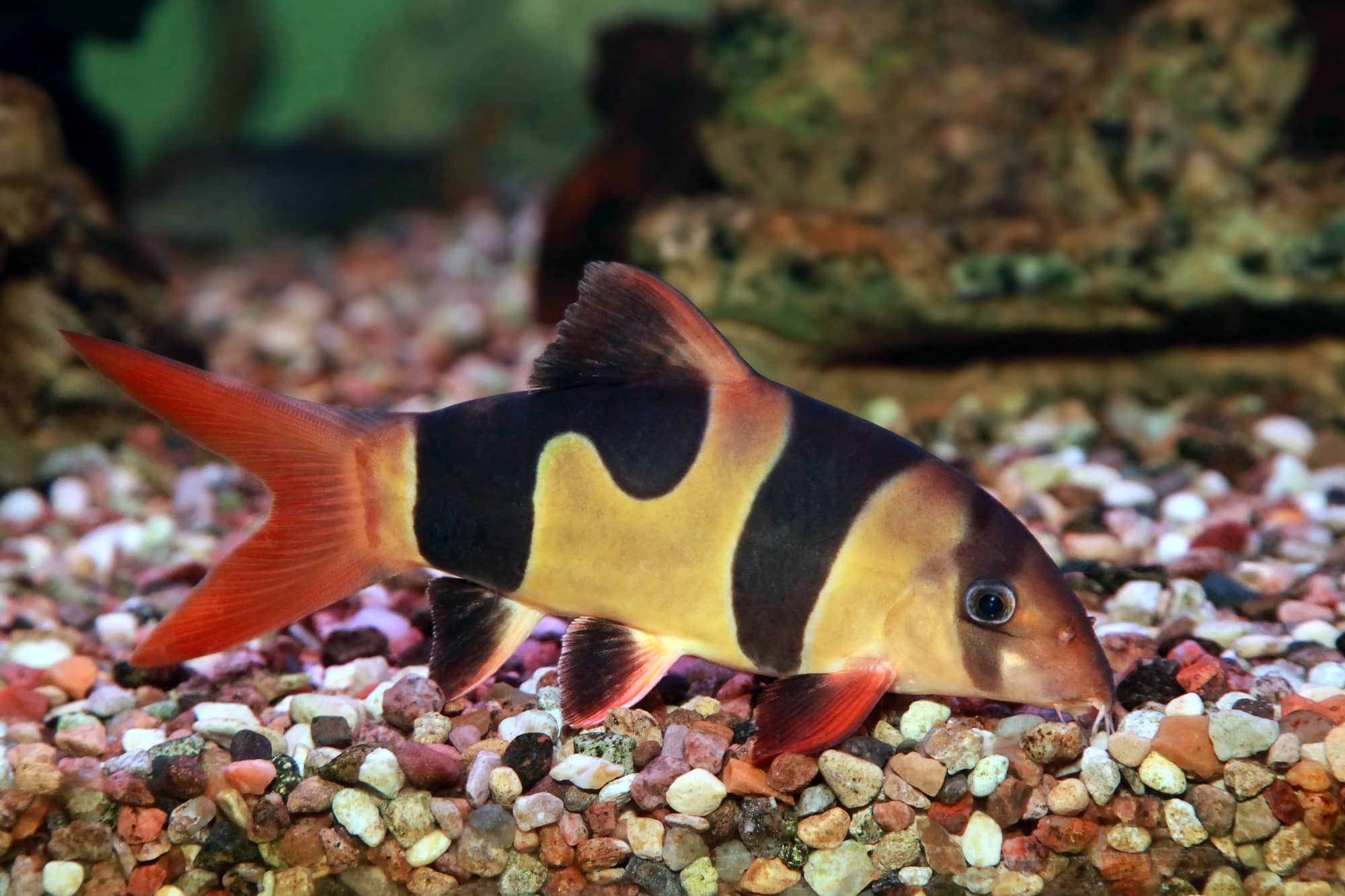
- Water temperature: 78°F to 87°F
- pH level: 6.0 to 7.5
- Water hardness: 5 to 15 dGH
The Clown loach is found in clear, running waters in the Greater Sunda Islands of Sumatra and Borneo, ranging through Indonesia into Malaysia.
These are active creatures that thrive when kept in large shoals of at least six to eight fish. Unfortunately, that means you need a big tank of at least 100 gallons to accommodate Clown loaches. These bottom-dwellers do best in a rectangular fish tank with lots of floor space and a soft, sandy substrate.
Pearl Gourami (Trichopodus leerii)
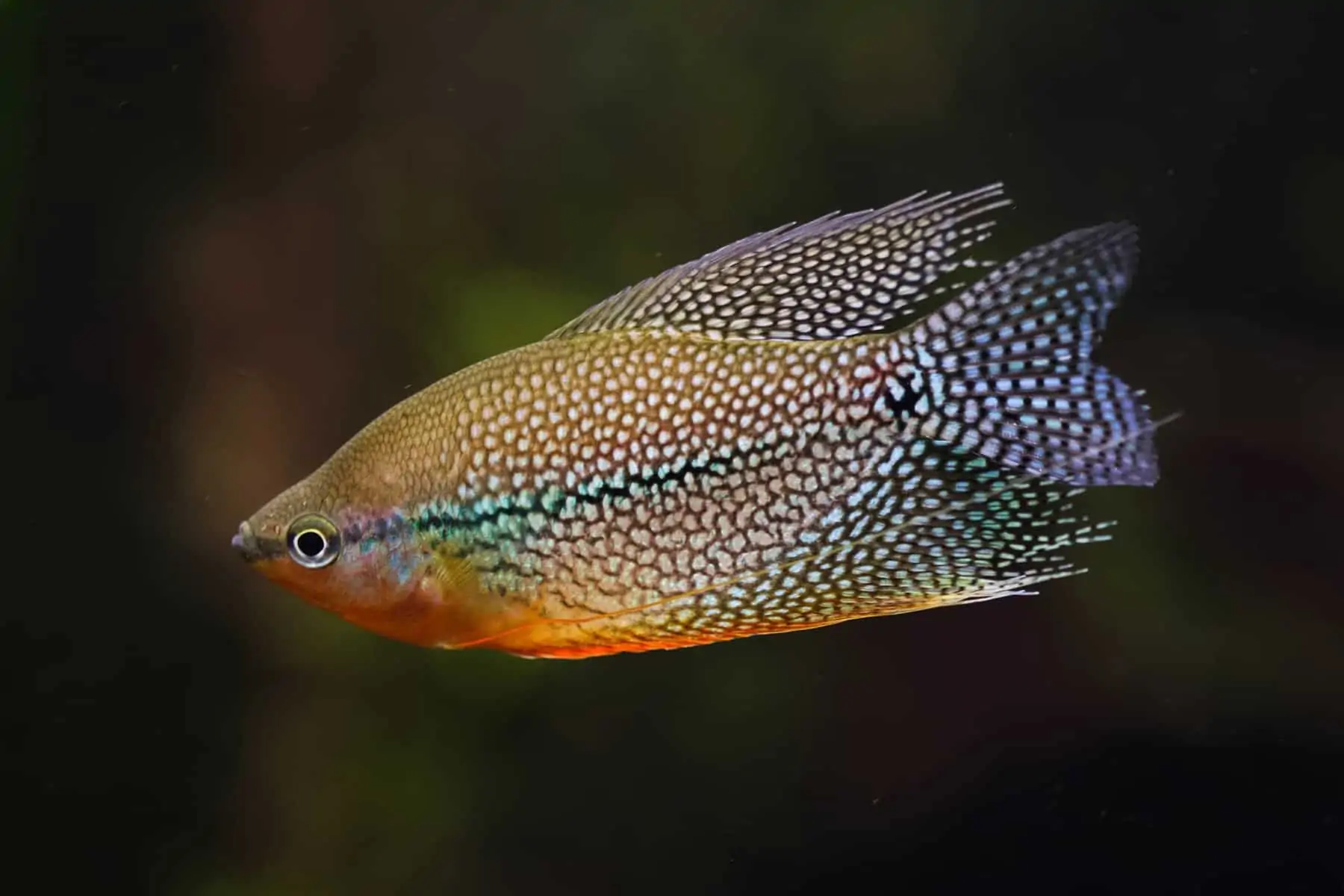
- Water temperature: 72°F to 78°F
- pH level: 6.0 to 8.0
- Water hardness: 2 to 30 dGH
Pearl gouramis need to be kept in schools of at least six fish. Since these gorgeous fish can grow up to 5 inches long, you’ll need a pretty large tank to accommodate them.
Although these charming fish are peaceful, we recommend you keep them in small harems. Keeping more than one male can cause some territorial issues unless your tank is large and heavily planted.
Corydoras Catfish (Corydoras)
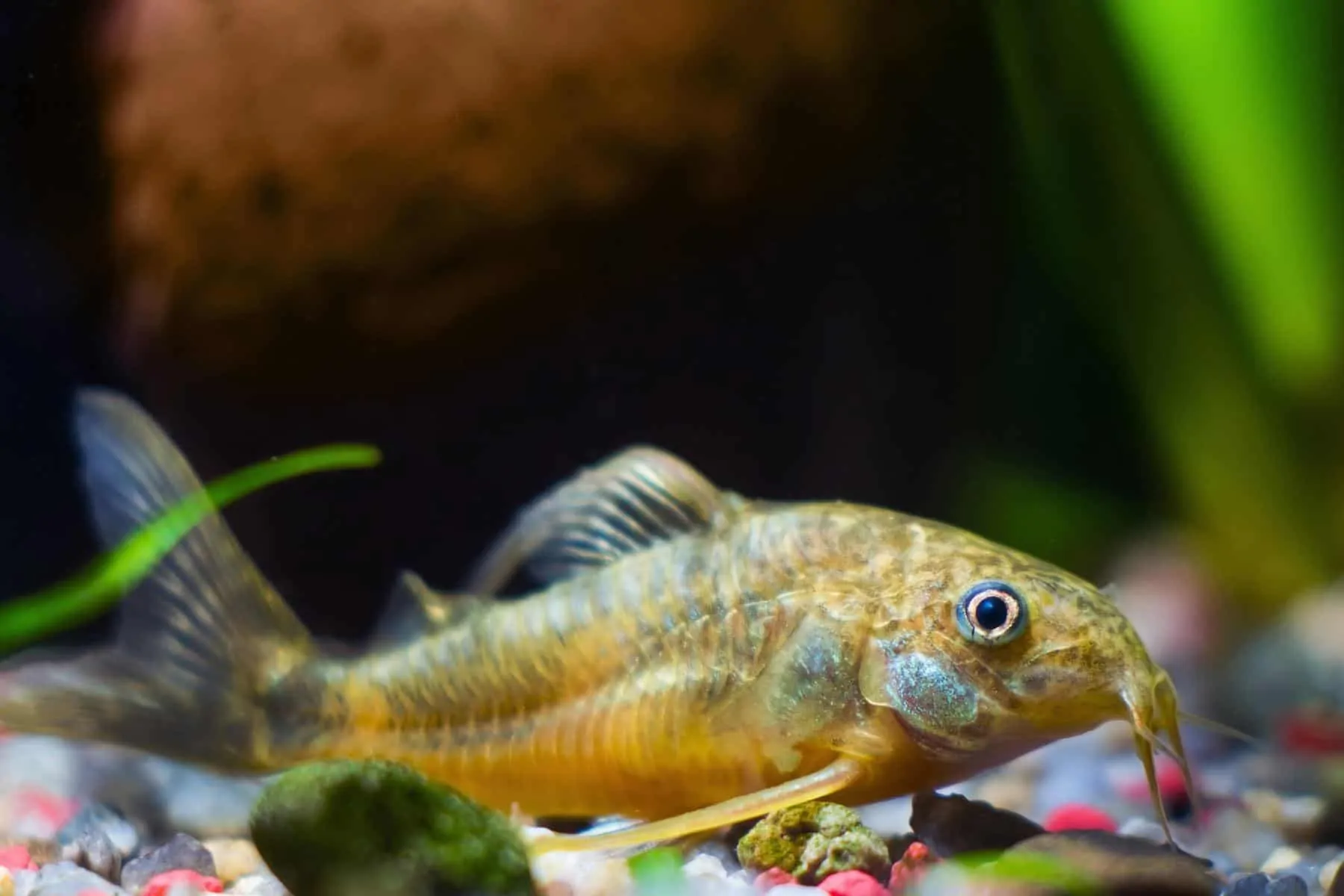
- Water temperature: 70°F to 78°F
- pH level: 7.0 to 7.8
- Water hardness: 5 to 10 dGH
There are over 150 species of Corydoras catfish, most of which prefer slightly softer water conditions than many aquarium pet fish.
These cute fish are hardy and can tolerate a wide range of temperatures and general water conditions. Corys are peaceful, entertaining little fish that spend most of their lives scuttling around the bottom of the tank or resting on the substrate.
Every so often, the fish will dart to the surface to grab a mouthful of air.
South American Dwarf Cichlids

- Water temperature: 75°F to 80°F
- pH level: 6.5 to 7.4
- Water hardness: 5 to 15 dGH
There are around 150 species of Dwarf cichlids whose maximum adult size doesn’t exceed 4 inches.
The term “Dwarf cichlids” encompasses many species, including:
- Apistogramma
- Nannacara
- Ivanacara
- Dicrossus
- Crenicara
In the wild environment, South American Dwarf cichlids inhabit shallow, slow-moving waters, where the substrate comprises fine sand and is covered with leaf litter from overhanging trees.
These fish are small and hardy, and most are peaceful. However, we recommend you thoroughly research your chosen species before making your purchase.
Betta Fish (Betta splendens)

- Water temperature: 76°F to 85°F
- pH level: 6.8 to 7.5
- Water hardness: 3 to 4 dGH
Bettas are also known as Siamese Fighting Fish and are extremely popular pet fish. Bettas can be classed as a soft water fish species, although most pet stores fail to tell their customers that.
Since betta fish don’t grow over 2 inches or so in length, you can keep these fascinating fish in a nano tank with a few peaceful companions, including snails and shrimp.
Bettas come in a wide range of beautiful colors and tail forms and can be taught simple tricks, making these fish fun and attractive pets.
Harlequin Rasboras (Trigonostigma heteromorpha)

- Water temperature: 72°F to 80°F
- pH level: 6.0 to 7.8
- Water hardness: 2 to 15 dGH
Harlequin rasboras are native to Malaysia, Singapore, Thailand, and Sumatra, where they live in densely vegetated peat swamps and slow-moving forest streams.
These attractive, peaceful fish do best in a blackwater habitat where the water has a low mineral content, and concentrations of dissolved humic acid are high.
Harlequin rasboras are schooling fish that need to live in groups of eight to ten individuals. However, these fish thrive when kept in larger numbers and make a glorious display. These are peaceful fish that won’t hassle or nip their tank mates.
Zebra Danios (Danio rerio)
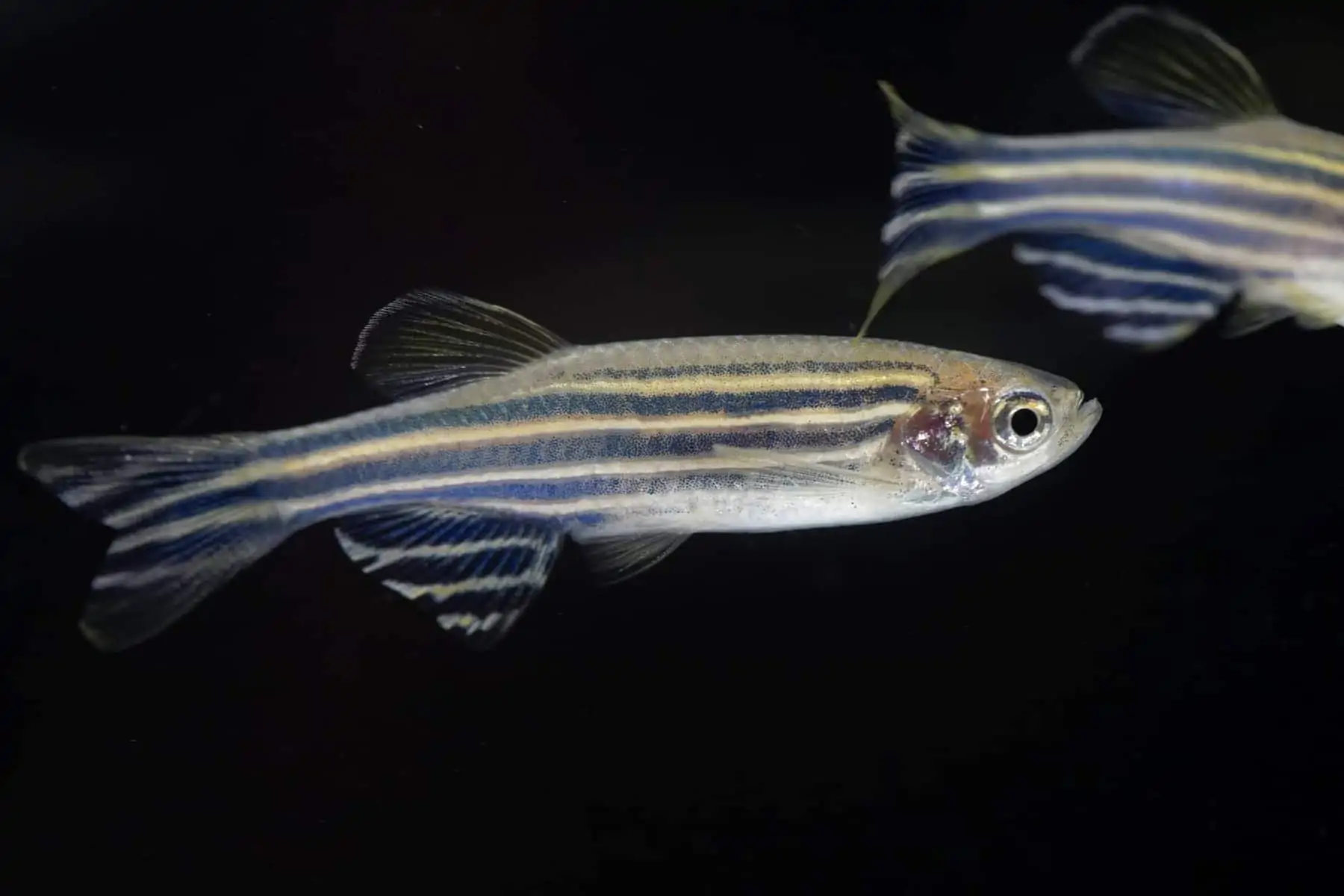
- Water temperature: 70°F to 78°F
- pH level: 7.0 to 7.8
- Water hardness: 5 to 19 dGH
Zebra danios are small freshwater fish that are a perennial favorite with aquarium hobbyists around the world.
These pretty little egglayers are easy to care for and are prolific breeders in the home tank, making them fun fish to keep.
Zebra danios prefer soft water conditions, although they are pretty hardy and can tolerate a wide range of water parameters and temperatures. Unlike many tropical fish species, you can keep these danios in an aquarium in temperatures in the low sixties without a heater.
Interestingly, Zebra danios remain loyal to their breeding partner, mating for life.
Can Invertebrates Live In Soft Water?
Invertebrates need calcium to maintain a healthy shell. For that reason, most inverts need to live in a tank with moderately hard water that contains sufficient minerals to maintain that.
The primary minerals of concern are magnesium and calcium. If you test your tank water for general hardness (GH), the test picks up only those minerals. Provided the level is 40 ppm, there should be sufficient minerals in the tank for your snails and shrimp.
In addition, if the pH is lower than 7.0, the acidic water can etch holes in snail shells. So, you want your pH close to or over 7.0 to avoid shell erosion.
However, some shrimp species can tolerate soft water conditions, such as Crystal shrimp.
FAQs
Here are the answers to a few of the most frequently asked questions about soft water in the aquarium.
Q: What Fish Cope Well With Soft Water?
A: There are quite a few fish species that prefer softer water, including:
- Tetras
- Angelfish
- Corydoras catfish
- South American cichlids
There are few species that appreciate extremely soft water, but the Clown killifish is able to tolerate those conditions.
Q: Is Softened Water Safe for Fish?
A: Softened water might not be safe for tropical aquarium fish, and the way some water softeners work can render the water unsuitable for fish.
Q: Do Fish Like Soft Water?
A: Most tropical freshwater and saltwater fish prefer moderately hard water conditions since they need the minerals the water contains for growth, development, and general health.
Final Thoughts
Did you enjoy our listicle all about the species of fish that prefer softer water parameters in your aquarium? If you did, please take a moment to share the article with other hobbyists.
Most species of tropical freshwater and marine fish prefer harder water since it contains the mineral levels they need for growth, development, and overall health.
However, quite a few soft water specialists will thrive in that environment, including those mentioned in our list above.
Do you keep soft water fish in your aquarium? Tell us about your fishy friends in the comments box below!

